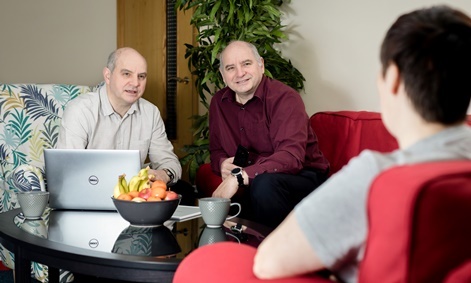In this two-part series, Game Dragons consultant Philip Oliver offers advice on getting a job in games, from the application process through to the interview stage. You can read part one here.
Interviews are really important for your career and you only get one chance to make a first impression.
We’ve interviewed hundreds of candidates over the years, so here’s our advice on making the best possible first impression and giving yourself the best chance of landing the job.
Following on from my last article, let’s assume you now have a great CV and portfolio and that your applications have led you to being invited for interviews.
Firstly, attend all the interviews you’re offered. You may have favourites, but actually visiting a studio can often bring surprises and you’ll learn a lot from each interview and get better each time.
What makes the best career move for you is not about their latest games or their public image, it’s how you feel about working there every day - the people, the atmosphere and the work they want you to do.
Preparation
Go back to their website and have a good search around. Have a look at their Twitter feed and Facebook page to see their recent news.
Find them on Google maps ahead of time, and drop the little yellow man outside their building so you know what you are looking for. The more research you’ve done in advance, the more confident you’ll feel on the day.
When it comes to what to wear, we’re sure you’re aware that you won't see many suits in the games industry. Aim to dress ‘smart casual’. It’s an interview and your appearance is important. Dressing smart makes you feel more confident, which is the aim - so don't overdress to the point you feel uncomfortable.
What makes the best career move for you is not about their latest games or their public image, it’s how you feel about working there every day.
Take the invite letter or email - with the address, date, time, etcetera - and a printed copy of your CV. Take a laptop or tablet if you have one and have the ability to quickly call up the portfolio work you’ve given them, as well as other work they’ve not yet seen.
It’s important you can find things easily, as it’s awkward and embarrassing hunting through files and directories for that one piece of work that the conversation has led you to wanting to show.
Some studios may at this stage ask for proof of right to work in this country (for most people that’s your UK passport), sight of your qualification certificates and evidence of your previous employment, if any. If in doubt, ask what you need to bring with you when you accept the interview slot.
Do some dress rehearsals with friends or relatives. You may feel a little silly doing them, but they will improve your performance when it comes to the real thing. If you really want to excel, try filming them and watch back your performance.
Punctuality
Aim to arrive at the studio half an hour ahead of time, so you know exactly where it is, then find a coffee shop to calm yourself prior to entering their building.
Oh and don’t forget to use the toilet whilst you wait! Aim to check in to their reception five minutes ahead of your appointed time.
Be cheerful, polite and positive to everyone you meet. They will form opinions based on their first interactions with you and in some cases their opinions may be fed back into the overall assessment.
What to expect
You’ll most likely be met by one of the interviewers, or have a member of the reception staff take you through to the interview room. Two interviewers is most common.
The smaller the company, the less structured and more informal the interview is likely to be. Be confident, friendly and let them guide the conversation.

Answer all the questions relatively concisely, ensuring you sell yourself as well as possible, and leave room for them to ask follow up questions if they want to know more. If you don't know something, don’t attempt to blag an answer - just be honest.
It’s most likely they will start with your CV, then allow you time to talk freely about your portfolio work. Whilst reviewing your portfolio, this is the time to show your passion and enthusiasm for the games industry. Do your best to relate it to the games they are making.
If it’s a rejection, don't take it personally, there are lots of other jobs out there and it’s a competitive market.
There should be ample opportunity for you to ask questions, so make sure you have some. Think in advance about what you’d like to know about a company you’re going to work at. It’s ok to have a note pad and some prepared questions. It’s possible they may show you around the studio a little - be engaged and ask questions as you go.
Avoid talking about money and certainly don't be the one to bring up the conversation. If they ask you what salary you are looking for, personally we’d recommend you throw it back to them, saying something like, ‘What do you consider a fair and competitive salary for this role?’
If they haven’t let you know before the interview is coming to a close, ask when you can expect to hear from them. Reassure them that you’d really like the job and that if anything else comes up you’ll let them know.
That’s a friendly and professional thing to do, and leaves them with a good impression even if you won’t be taking a job with them at this time. You won't need to give specifics in that event, only that you’ve had another offer, or that you are no longer able to take a job with them, if that becomes the case.
Later that day, or the next day, write and say thank you for their time and the opportunity.
Waiting for the offer(s)
Hopefully, within a few days of each interview, you’ll hear whether or not you were successful. Expect this to arrive in writing, as either an email or a letter.
If it’s a rejection, don't take it personally, there are lots of other jobs out there and it’s a competitive market. It’s not necessarily a reflection on you that they’ve gone with someone else. You’ve lost nothing. In fact you’ve gained experience and confidence for the next interview.

If it’s a job offer, fantastic and congratulations! Now the question is, should you accept it? Most studios will give you a few days to respond, but if you are going to take a few days, email back and let them know how delighted you are at receiving the offer and that you need a few days to consider, since it’s a life-changing decision. Going silent for more than a couple of days will not look good.
If the offer is not what you expected, talk to them. Changing the starting date won't usually be a problem, but attempting to negotiate the salary is high-risk. If you really can’t accept it, then you need to be open and honest.
We spend the best part of our lives at work, so you need to look forward to going to work each day if you are to be happy and fulfilled.
If you are holding out on news from another interview, you need to put polite pressure on the other explaining you’ve had a job offer and need to know if they will be making one or not.
You want to give an answer to the studio offering you the job as soon as possible. It’s not considered bad form to be honest about other job offers, although you shouldn’t reveal any of the details.
If you have two or more offers, what a lovely problem to have! You’re clearly talented and have been well prepared. If you are in the fortunate position of being able to choose, do not put too much emphasis on the salary.
Other things, like location, atmosphere of the office, friendliness of the people and the game you’ll be working on, are all as important, if not more, than money. We spend the best part of our lives at work, so you need to look forward to going to work each day if you are to be happy and fulfilled.
That’s how a great career in the games industry should start.
Good luck!






















